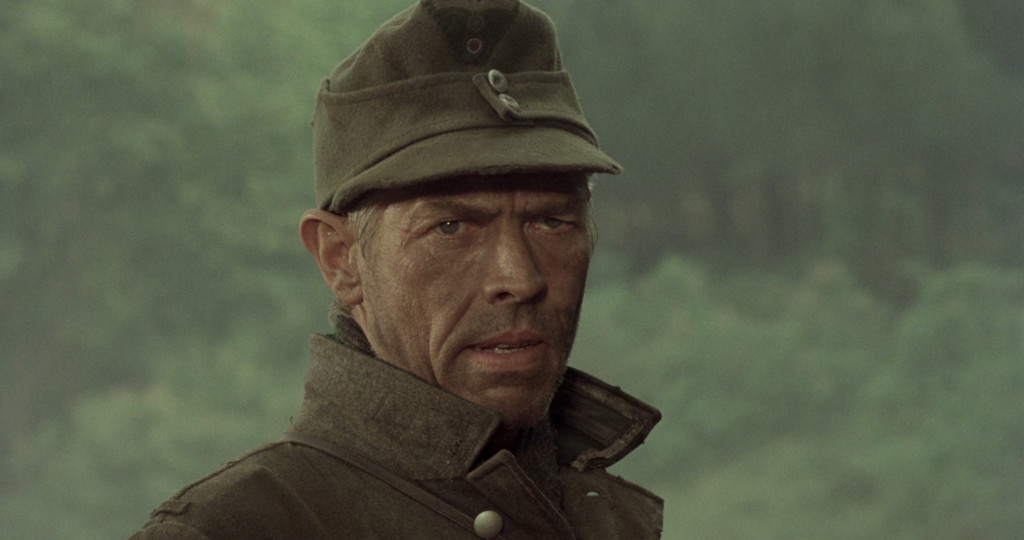Thomas Humphrey reviews Sam Peckinpah’s 1977 World War II drama “Cross of Iron”, a forlorn account of the Nazi’s retreat from the Taman Peninsula in 1943 that works as both a study of history and a reflection of the Cold War era in which it was made.
Sam Peckinpah’s Cross of Iron is a great example of film’s power to interact with history. It also potently demonstrates stories’ ability to speak to the present via the past. In fact, you need only watch the opening sequence of Cross of Iron to realize what an incredibly savvy and compelling adaptation of Willi Heinrich’s original novel you are about to witness.
Immediately it calls forth an entire history of masculine ideology by blaring Franz Weidmann’s nineteenth-century folksong Hänschen Klein at us. This German song is about becoming a man, but the lulling nursery rhyme is unnervingly sung at us by a children’s choir. And if that weren’t juxtaposition enough for you, militaristic instruments repeatedly interrupt too, and the whole thing sounds against a terrifying backdrop made up of two distinct, jarring kinds of archive footage.
One kind of footage is made up of fawning Third Reich propaganda, and the other is made up out of the horrors of mechanised warfare. Side by side, these images immediately deliver a damningly clear message from the pages of history: together, the unholy triumvirate of masculinity, rampant imperialism and modern warfare lead only to utter devastation and total war. This is the anti-war message that begins the film’s own forlorn account of the Nazi’s retreat from the Taman Peninsula in 1943.
It should be no surprise that this film was made by an American director in a post-Vietnam 1977. The film’s hellish sense of apocalyptical scale definitely speaks directly to that era throughout. But what makes this studied film truly wonderful is the fact that its cleverly constructed dissonance seems deeply entrenched in an Absurdist tradition which stretches right back to the First World War. As a result, the film feels emotively rooted in a long history of both European and American post-war malaise.
The film’s relationship with history is anything but academic, however. Its world of men is full of cavorting male escapades and desperate acts of camaraderie and bravery. Cross of Iron therefore comes right from the guts of the golden period of Hollywood cinema, where films were both smart and experimental whilst still retaining strong and appealing narratives. But the film also clearly hasn’t escaped that dated American vibe that society must be saved by certain kinds of selfless males, either.
Perhaps the saving grace for this fullblown seventies epic is the fact that it gives an incredibly rare voice to the Germans soldiers of World War Two, making Cross of Iron quite a touching correction to history itself. Indeed, even the title refers ambiguously to both the German medallions for bravery and the crosses which adorned the Germans’ graves. Plus the film’s message about the futility of war does become a much denser one when presented from the side of those who we know are always destined lose.
Although the fact that that German voice does have to be presented in an often very American-sounding English, and set against a sinister-sounding Russian mother-tongue, equally suggests more sinister historical undertones. The film may be being allowed to rebel both against war and a particular version of the history of war, but it is still very unable to escape the Cold War’s social fabric.
Like many seventies classics, the film’s strange world is also very much a product of its era as it is somewhat woefully male-centric, and these characters’ struggles turn into a piece of masculine crisis fiction as a result. Small boys even increasingly take the place of men in the film, causing the traditional acts of masculinity that we see to deeply lose currency and become horrifically more absurd. An exquisite world of sloshing and jumping carnivalesque madness then results because of this, and visually speaking this definitely makes for some of the finest scenes in Cross of Iron.
So what we see is Cross of Iron furiously rebelling against a glorified version of World War Two’s history, and by doing so it also tears at the social wounds of the Vietnam War. But it has had to do so from a distanced perspective that safely leaves the American historical narrative untouched. What’s more, it hasn’t escaped, either, the history of patriarchy or the Cold War that surrounds it. And these are both tensions which the film itself has suggested lead to terrible acts of attrition, so perhaps a cyclical reintroduction of Hänschen Klein coupled with Steiner’s insane laughter was the only sound response to both the present and the past ultimately recognised by Sam Peckinpah.





I’m delighted to see so many positive articles about this stunning film! Thanks for your piece.